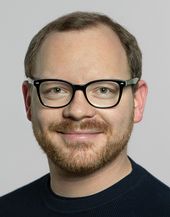Simon Schäfer

Fellowship
Rudolf Mößbauer Tenure Track
Appointment
2022
Institution
Technical University of Munich
Department
Psychiatry and Psychotherapy & TUM Center for Organoid Systems and Tissue Engineering
Focus Group
Advanced Organoid Technologies for Mental Health Research
Short CV
Prof. Simon Schäfer studied medicine and biomedical sciences in Greifswald and San Diego and received his PhD in 2015. He then joined the Salk Institute for Biological Studies (La Jolla, California) as a postdoctoral fellow. For his research into human-specific brain disorders, he received the NARSAD Young Investigator Award from the Brain and Behavior Research Foundation. In 2022, he joined the Department of Psychiatry at TUM as assistant professor for Advanced Organoid Technologies. His lab is part of the newly established Center for Organoid Systems and Tissue Engineering (COS).
Selected Awards
- 2023, Early Excellence Academy Member, Cluster for Systems Neurology Munich (SyNergy)
- 2019 & 2022, NARSAD Young Investigator Award, Brain & Behavior Research Foundation
- 2016, DFG Postdoctoral Fellowship, German Research Foundation
- 2015, Postdoctoral Fellowship James S. McDonnell Foundation (JSMF) for Understanding Human Cognition
- 2008, Student Scholarship, German National Academic Foundation
Research Interests
As live human brain tissue is inaccessible, most studies of this organ have been restricted to the analysis of post mortem tissues or animal models, which bear a limited resemblance to the complexity of living human physiology. Organoids are emerging as novel technologies that allow to recapitulate the structure and function of various human organs in vitro, including the human brain. These tools have the potential to revolutionize the future of biomedical research. Our group focuses on advancing these technologies to push the boundaries for personalized research on human brain disorders and to identify strategies for facilitating brain repair. The lab is currently located at TranslaTUM and will also be part of the newly founded TUM Center for Organoid Systems and Tissue Engineering (COS).
Selected Publications
- Schafer S.T.#*, Mansour A.A.*, Schlachetzki J.C.M., Pena M., Ghassemzadeh S., Mitchell L., Mar A., Quang D., Stumpf S., Santisteban Ortiz I., Lana A.J., Baek C., Zaghal R., Glass C.K., Nimmerjahn A., Gage F.H.* (2023) An in vivo neuroimmune organoid model to study human microglia phenotypes. Cell 186, 2111-2126 [#Lead contact and *co-corresponding author]
- Wang M, Gage, FH & Schafer, ST* (2023) Transplantation strategies to enhance maturity and cellular complexity in brain organoids. Biological Psychiatry 93, 616-621. doi: doi.org/10.1016/j.biopsych.2023.01.004 (*corresponding author)
- Schafer, S.T., Paquola, A.C.M., Stern, S., Gosselin, D., Ku, M., Pena, M., Kuret, T.J.M., Liyanage, M., Mansour, A.A., Jaeger, B.N., Marchetto, M.C., Glass, C.K., Mertens, J. & Gage, F.H. (2019) Pathological priming causes developmental gene network heterochronicity in autistic subject-derived neurons. Nature Neuroscience 22, 243
- Herdy, J., Schafer, S.T., Kim, Y., Ansari, Z., Zangwill, D., Ku, M., Paquola, A., Lee, H., Mertens, J. & Gage, F.H. (2019) Chemical modulation of transcriptionally enriched signaling pathways to optimize the conversion of fibroblasts into neurons. eLife 8, e41356
- Gonçalves, J.T.*, Schafer, S.T.* & Gage, F.H. (2016) Adult Neurogenesis in the Hippocampus: From Stem Cells to Behavior. Cell 167, 897–914 [equal contribution]
- Han, J., Kim, H.J.*, Schafer, S.T. *, Paquola, A., Clemenson, G.D., Toda, T., Oh, J., Pankonin, A.R., Lee, B.S., Johnston, S.T., Sarkar, A., Denli, A.M. & Gage, F.H. (2016) Functional Implications of miR-19 in the Migration of Newborn Neurons in the Adult Brain. Neuron 91, 79–89 [equal contribution]
- Schafer, S.T., Han, J., Pena, M., von Bohlen und Halbach, O., Peters, J. & Gage, F. H. (2015) The Wnt Adaptor Protein ATP6AP2 Regulates Multiple Stages of Adult Hippocampal Neurogenesis. J Neurosci 35, 4983–4998 [*co-corresponding author]
- Mertens, J., Wang, Q.W., Kim, Y., Yu, D.X., Pham, S., Yang, B., Zheng, Y., Diffenderfer, K. E., Zhang, J., Soltani, S., Eames, T., Schafer, S.T., Boyer, L., Marchetto, M.C., Nurnberger, J.I., Calabrese, J.R., Oedegaard, K.J., McCarthy, M.J., Zandi, P.P., Alda, M., Nievergelt, C.M., Mi, S., Brennand, K.J., Kelsoe, J.R., Gage, F.H. & Yao, J. (2015) Differential responses to lithium in hyperexcitable neurons from patients with bipolar disorder. Nature 527, 95–99
- Schafer, S.T., Peters J. & von Bohlen Und Halbach O. (2013) The (pro)renin receptor / ATP6ap2 is expressed in the murine hippocampus by adult and newly generated neurons. Restor. Neurol. Neurosci. 31, 225–231
Google Scholar: https://scholar.google.com/citations?user=ZuBVFZkAAAAJ&hl=en